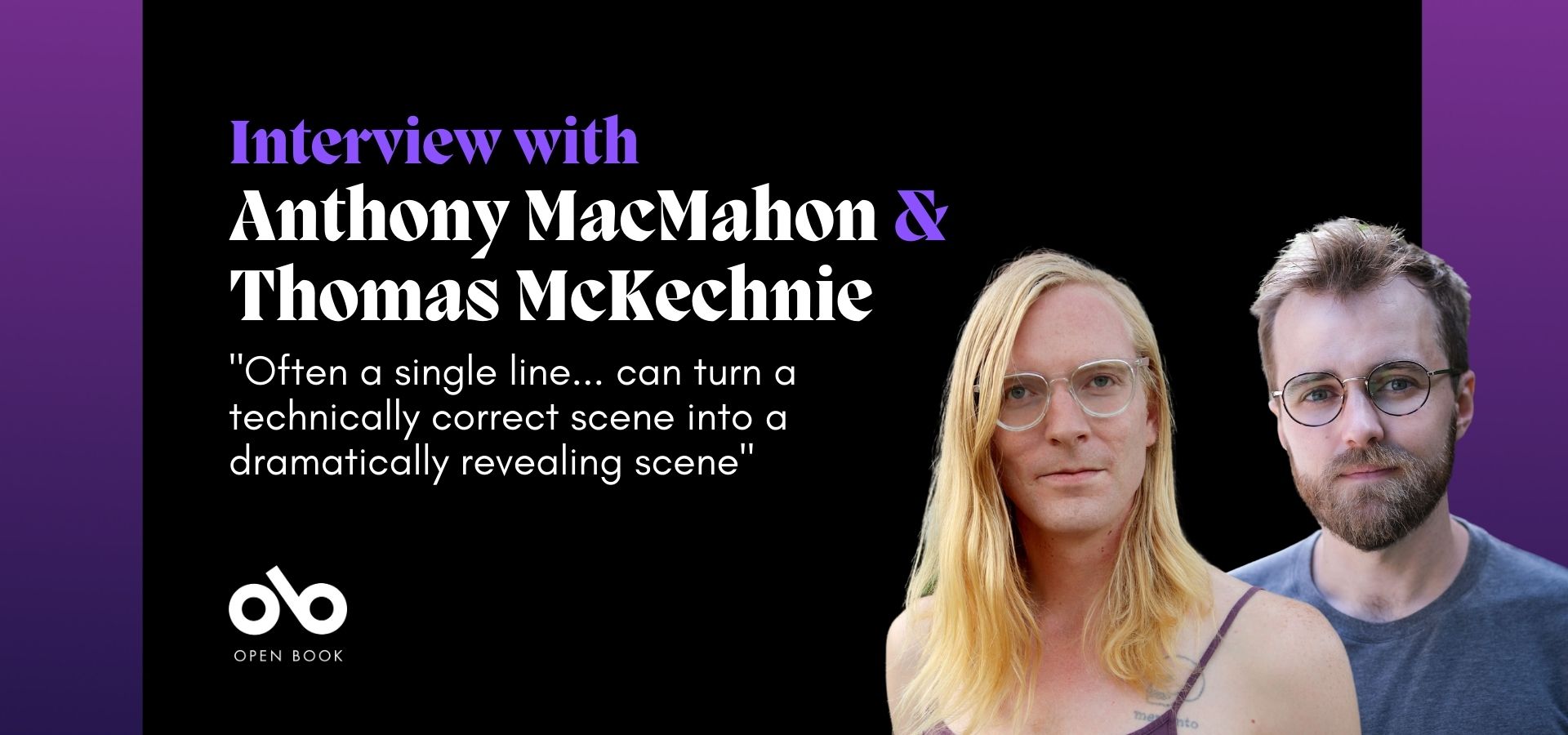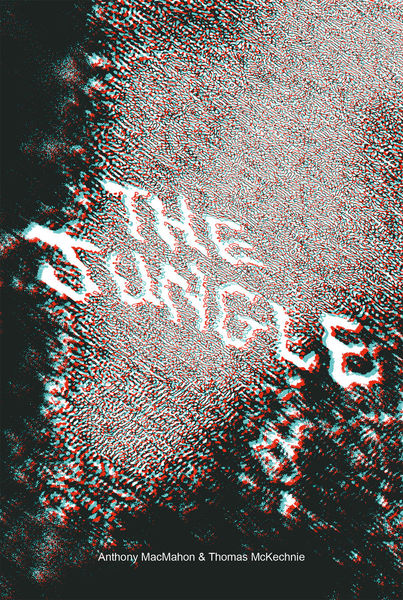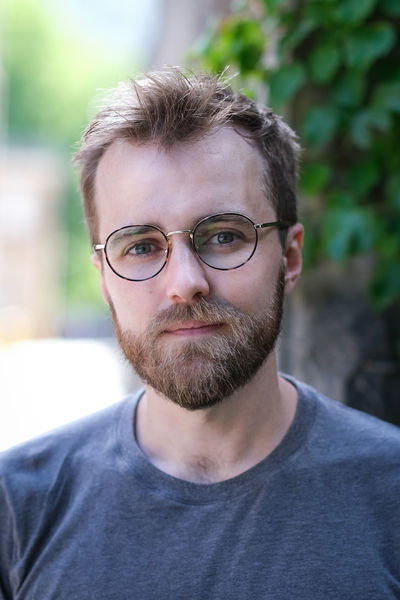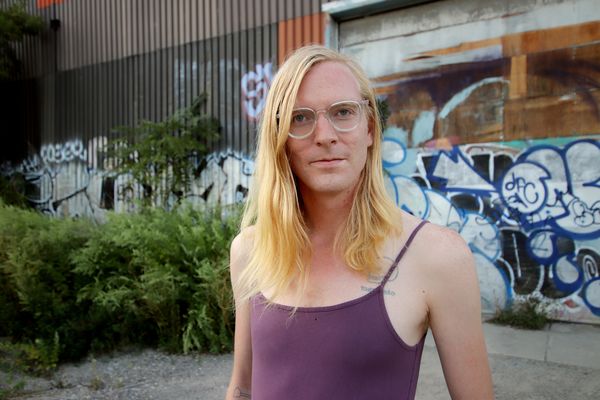Anthony MacMahon & Thomas McKechnie on Harrison Ford, Vomit, and Stolen Moments as Part of Their Playwriting Process
The adage "all you need is love" might be catchy, but it overlooks the reality of life under late stage capitalism for many. Jack and Veronyka start out with an unshakable bond, the two of them against the world in an unaffordable, unsympathetic city in Anthony MacMahon and Thomas McKechnie's The Jungle (Playwrights Canada Press), a play loosely based on the iconic 20th novel of the same name by Upton Sinclair.
The two meet when Jack, a second-generation Chinese Canadian working as a cab driver, picks up Veronyka, an undocumented factory worker and waitress from Moldova, to drive her from one of her never-ending jobs to another.
Their instant chemistry, electrifying in the stolen few moments they have to connect between the crushing obligations they juggle, is moving, and sets a high height for the young lovers to tumble from. And tumble they do, as the pressures to provide for their families and the deaths of both of Jack's parents send the couple into financial and emotional spirals. When chance offers them a less-than-savoury way to ensure their futures, they have little chance but to jump at it – but deals with devils rarely make for long term happiness, especially for the most vulnerable.
Scathing, smart, and driven by a raw truthfulness both emotional and political, The Jungle is a tough but clear-eyed indictment of urban inequality and its ripple effects. We're speaking with MacMahon and McKechnie about their powerful play today, and they tell us about their collaborative creative process, the cheeky Harrison Ford quote that they keep in mind when writing, and how a sighting of "recreational vomit" became a strange element of inspiration for The Jungle.
Open Book:
Is your writing process totally page-based, or do you sometimes speak dialogue aloud (alone or with others) or try physically blocking out scenes while writing to work through things?
Anthony MacMahon and Thomas McKechnie:
As a writing duo, we have a page-based process that comes out of discourse. We meet every week when we’re working on a project and have a mostly meandering discussion about whatever’s been on our mind for the past week—politics, art, labour, the city—noticing when our preoccupations speak to the script and where they diverge.
After taking 75% of our meeting time having this discussion, we read the pages each of us have written throughout the week. We always read them aloud – always remembering a comment that Harrison Ford allegedly made to George Lucas, which was “try moving your mouth when you type”. It’s important to us to remember that as beautiful as our words may look on the page, that’s not where most people will experience them. After that, we comment on the pages, highlighting elements that could be theatrically enjoyable, character moments that should be fleshed out in other scenes, and what point in the arc these scenes occupy. Then we assign ourselves new scenes based on what we’ve heard in the discussion and on the page.
Open Book:
What one play, from any time period, do you wish you had been the one to write?
TK:
Angels in America
AM:
Mother Courage and her Children
Your CanLit News
Subscribe to Open Book’s newsletter to get local book events, literary content, writing tips, and more in your inbox
Open Book:
What has been your most unlikely source of inspiration?
AM & TK:
When we were writing The Jungle, Tom saw vomit on the sidewalk walking past the hospital to Anthony’s old apartment on Beatrice street. There’s a line that comes up in the play “this was recreational vomit. This was the vomit of people so healthy and wealthy and bored that they could afford to make themselves sick”, and much of the writing of The Jungle came out of moments like that, seeing the disparity between something like a hospital that serves people who are on the fringes of society and the bevy of cool bars less than a block away.
A lot of the writing occurred between shifts as a gig worker, trying to cram a few pages into the two odd hours between the lunch and dinner rushes as a food delivery courier. The meetings took place at Anthony’s apartment, which had a huge hole in the kitchen ceiling due to neglect by the landlord, who had refused to fix the roof. While Tom would smoke, Anthony would grab a broom and sweep snow melt and pooling rainwater off the roof to prevent another hole from forming. Strange little interactions like this – moments stolen between shifts, recreational vomit in liminal spaces, insane acts of maintenance for a million dollar home – inspired the play in more ways than one.
Open Book:
Are there themes, objects, or activities that you see cropping up repeatedly in your work that you are surprised by?
AM & TK:
Cooking pops up in our plays a lot – we repeatedly have characters retire to domestic moments, and something about the aroma of food is really evocative to us. There are frequently cabs, which has something to do with the urbanism and city thinking of the play, characters who have places they need to be but can’t rely on an underfunded public transit system. Finally, there’s bodily damage. People break and cut and fall apart.
Open Book:
What do you do with a play in progress or a scene that just isn't working?
AM & TK:
One of the advantages of writing plays in teams is that we can break things down together. On The Jungle, we had a framework from loosely adapting the Upton Sinclair novel, which allowed us to look at why the scenes worked or didn’t in his novel, and contrast them with where our play needed to go. When working on a play, we try and focus on finding the essential thing in the scene – it’s often a single line or moment that can turn a technically correct scene into a dramatically revealing scene. We rewrote the final scene of The Jungle fifteen or twenty times before finding the moment where the characters talked down to the waitstaff. We realized that we needed to find that iconic moment which not only progressed the plot, but ultimately demonstrated that these characters were irrevocably changed.
Open Book:
How do you see theatre and playwriting changing and evolving at this point? What excites you about those changes as an artist?
AM & TK:
Something that excites both of us is that as theatre practice becomes more inclusive and diverse, the old forms are being destroyed and reinterpreted in hundreds of different ways, because every aspect of gatekeeping becomes a little weaker. At the same time, the housing crisis has calcified intellectual developments in the arts, which is something that needs to be challenged. As such an essential item in the hierarchy of needs, a lack of decent shelter means that the artists who have the most time to practice and refine their crafts are those who have housing security which isn’t afforded to most.
Open Book:
What is the worst thing about being a playwright, and what is the best?
AM & TK:
The worst part about being a playwright is the money. I (Anthony) remember a debate among established playwrights when I was at Banff in 2012. They were talking about a survey of Canadian playwrights that had been done sometime in the recent past, and how it showed a pretty significant gender gap in payment. However, when Norm Foster was pulled from the list, almost the entire pay gap was removed – both genders (this was a binary study) were equally broke. And I believe it’s only gotten worse among our generation and the generation after us, as more theatre schools graduate people with no career prospects. Sometimes it seems like Canadian public policy, in arts, in housing, in transportation, is more interested in flipping and speculating than it is in building. I’m writing these answers as our friends in film and television have voted to strike – solidarity with them.
The best part(s) are all the cliche parts – getting to be in a room with actors as they workshop your script, getting to see it being rehearsed, premiere in front of a crowd, do a talkback with people who were affected by the story, yelling at your colleagues about the bad play you just saw hours later in the fringe tent, bumping into an artist friend that you haven’t seen for years at some Chekhov play and feeling transported by the combination of that conversation and the play, as if you’re experiencing the same feelings that Chekhov and Konstantin did about the need for new forms while simultaneously being engaged by an old form. Those parts are all pretty good.
__________________________________________________________
Anthony MacMahon is a Canadian playwright currently working in Toronto. His works include Animal Farm, The Voyager Concert, The Dead (Soulpepper), Trompe la Mort, and Wild Dogs on the Moscow Trains (SummerWorks). He was until recently a planning advisor to former city councillor Joe Cressy and is currently a project lead at the City of Toronto in Solid Waste Management. He’s honoured to be an alumni of the Soulpepper Academy, Concordia University, and the University of Saskatchewan.
Thomas McKechnie is a Toronto-based playwright and union organizer. They were a part of the 2013–2015 Soulpepper Academy as a writer. Writing credits include The Jungle (Tarragon Theatre, co-written with Anthony MacMahon), 12 Letters from Your Lover, Lost at Sea (with Hannah Kaya), Worm Moon (the Theatre Centre’s Residency Program), 4 1/2 (ig)noble truths (zeitpunktheatre/Why Not Theatre, presented in Toronto, Victoria, Vancouver, and more), and Remembering the Winnipeg General (ziepunktheatre). They are a founding member of Artists for Climate and Migrant Justice and Indigenous Sovereignty.







